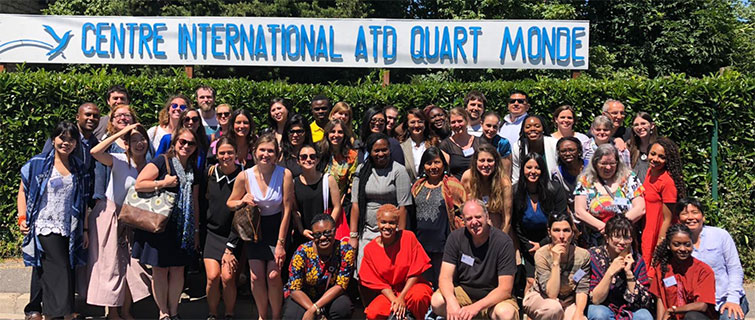
The East Asian representative was impressed: Just who were those expert American consultants, and how was ATD Fourth World—a French antipoverty group that operates around the world, but on a very limited budget—able to afford them?
Speaking at ATD’s July conference in Paris, the visitors urged the nonprofit to identify a new audience of potential donors and volunteers: Young “digital natives,” well-versed in social media and “innately confident” that their actions could have “a scalable impact” on the world’s most intractable problems.
Then the speakers showed how ATD might do that—through targeted social media posts, podcasts featuring the nonprofit’s own experts, and a revamped website that illuminated its unique philosophy through compelling stories from its grassroots projects around the world.
“In conversations with colleagues this week, I’ve heard multiple times how people plan to build on your recommendations and incorporate your ideas in our work going forward,” wrote Dave Meyer, ATD’s special projects & outreach manager, in an email to the head of the U.S. contingent. “If there’s one phrase that has come up again and again, ... it has been: The students really listened.”
A Different Kind of Class
Yes, students. The visitors were not expert consultants, but graduate students from Georgetown University’s Master’s in Integrated Marketing Communications, Master’s in Public Relations & Corporate Communications, and Master’s in Global Hospitality Leadership programs. In a class called Global Immersion, they study the latest social media platforms and how they are being used in six regions of the world. Later, they examine the issues facing a particular international organization, make recommendations for its communications strategy, and travel overseas to present those proposals in person.
The class examines two related trends: Increasing globalization and the rise of new media that is largely responsible for bringing that about.
For many years, there was relatively little change in the way marketers got their messages out, said instructor Wendy Zajack, Faculty Director, Integrated Marketing Communications. They relied on the dominant media of the day: TV, radio, and print.
The smartphones revolution is changing that paradigm, Zajack said, and those changes, however groundbreaking, are still developing. Now marketers can reach out to individual consumers anywhere in the world—billions of them, without regard for national boundaries or whether or not they have access to radio or TV. Soon, virtually everyone will be connected, and for marketers this phenomenon will create both tremendous opportunities and unprecedented risk.
“Word of mouth can make you a superstar overnight,” Zajack said. “But it can also crush you.”
But while internet culture may seem universal and ubiquitous, it still operates within the context of national and local mores, hence the need for marketers to learn about these diverse cultures that the internet has suddenly thrown together. An ad that sounds clever in one culture may appear snarky in another. Similarly, global hoteliers like Hilton or Marriott must be sensitive to the different cultures in which they operate and adjust their services accordingly.
“The class is really looking at global differences in marketing and communications,” Zajack said. “And we do that, in part, by picking a client who we are going to help market a product.”
Or, in this case, an idea.
A Life Serving the World’s Poor
ATD Fourth World was founded more than 60 years ago by Joseph Wresinski, a Catholic priest. The child of immigrants, he was born during the First World War in a French refugee camp for foreigners whose allegiance was questioned by the French government. It was there, separated from French society, that Wresinski first experienced extreme poverty and the marginalization and virtual invisibility that go with it.
“The very poor revealed to me the day-to-day realities of lives which unite them across cultures and continents and which mean that they all live as outlaws, everywhere,” he wrote. “These realities led them to choose the term ‘Fourth World’ to designate themselves as a people outside of all the worlds that others have fashioned for themselves.”
In 1987, Wresinski urged the United Nations to consider the perspectives of the very poor in its philosophy and programs, according to Quentin Wodon, of the World Bank Group. Wresinski, he said, “was instrumental leading the [UN] Commission for Human Rights to adopt a series of resolutions on extreme poverty and rights…”
That philosophy is reflected in grassroots projects around the world where ATD works with—not for, the distinction is important—the world’s more destitute inhabitants. Among its many programs: A literary class in Tanzania, a street library in a poor section of New Orleans, and a “Working and Learning” jobs and education program that offers dignity to adults in Guatemala.
In addition, ATD (which stands for “All Together in Dignity”) also operates the Joseph Wresinski Centre, which assesses the work of ATD and other antipoverty organizations and houses thousands of papers, videos, photographs, and other documents from Wresinski’s life.
When Wresinski died in 1988, he was celebrated among his generation of antipoverty and human rights activists. But three decades later, he is less well-known, particularly among Gen Z and millennials—the very age groups ATD needs to connect with to replenish an aging donor and volunteer base. And that’s where the young marketing and hospitality students could help.
A Passion for the Common Good
Though strongly influenced by Wresinski’s Catholic background, ATD is not religiously affiliated today. Still, the Georgetown students saw a great opportunity in the organization forming partnerships with Catholic universities in the United States, such as Georgetown and Notre Dame, that share ATD’s values and educate thousands of young people from the United States and around the world.
Yet even while it reaches out to Catholic institutions, the nonprofit cannot afford to neglect young people from other faith traditions, or no religion at all. Religion affiliation is declining steadily in both the United States and Europe, especially among young people, and yet the idea of religion still has a pull. According to a 2017 Gallup poll, 55 percent of Americans said religion can answer all or most of today’s problems. And when a fire gutted Notre Dame Cathedral in Paris this spring, the entire world mourned.
Is there a model for an institution that is informed by its religious values and beliefs yet still welcomes, as full participants in its programs and daily life, those from other religions, or no religion at all? It turns out, there is in Georgetown itself, a Jesuit institution that also supports the spiritual life of Protestant, Jewish, Muslim students, students of other religions, and those with no religious identity.
“At its core, Jesuit education is about training our senses and intellect to accurately see and experience the world in its reality,” said Jamie Kralovec, associate director for mission integration at Georgetown’s School of Continuing Studies. “Georgetown's Jesuit values invite all of us, regardless of our religious commitments and the specific academic discipline of our study, to move from reflecting on the world we experience to acting generously in the world on behalf of justice and the common good.”
That message resonates with Skye Curry, a student from the program in Global Hospitality Leadership.
“Yes, you’re a minority attending an elite university,” she said, referring to herself. “But you still have to give back.”
Kelly Moya, a student from the Integrated Marketing Communications program, suggested that ATD, with its considerable expertise, could increase brand recognition and reach out to younger audiences through relatively inexpensive podcasts. It could also sponsor conferences and retreats and partner with more well-known charities that could help get its message out.
For the Georgetown students, the course—with its intensive project and presentations before a global audience—highlighted the unique qualities and gifts they have to offer as they learn more about their professions and advance in their careers.
“Global work is amazing, exhausting, challenging, confusing, and rewarding all wrapped together,” wrote Zajack. “I ended the trip with four key reflections that I wanted to share: 1) words matter 2) communication matters 3) the world is a much smaller place than it sometimes seems 4) one person can make a difference, change the world, and start a movement.”
